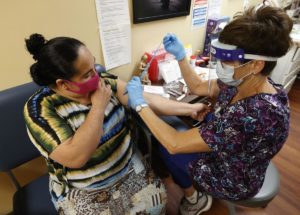
Across the country, Latino clinics have fought the COVID-19 pandemic which has threatened to devastate their communities from the beginning. Early in the pandemic, these clinics were aware that they would have to find their own ways to inform their communities about the virus, treat them when they got sick, basically ensure that their communities weren’t forgotten.
As the country has now moved to massive vaccinations and online vaccination appointment systems, some Latino health clinics are calling on the federal and state governments to use them to reach vulnerable communities such as people of color and immigrant communities, as well as stock them with resources to do so.
The need to step up vaccinations while still trying to stop the spread of COVID19 makes the clinics’ role even more important. According to the Centers for Disease Control and Prevention (CDC), out of the 62.5 million people who have received at least one dose of the vaccine, 65.5% were white compared to only 8.5% who were Latino.
Many of the clinics have scrambled to find outside funding to buy and install partitions and other equipment to continue serving patients safely. Paloma Izquierdo- Hernandez, Urban Health Plan’s President and CEO stated, “We do quite a bit of COVID testing, and then to add the vaccines, we really had to segregate staff — that’s costly, because the vaccinators for the most part are nurses. Not only is there a short supply of nurses, but they’re expensive.”
She also added that scheduling second appointments for the two- dose vaccines and completing state- mandated paperwork add to the new workflow, “so combining all of that and just trying to do the best job that we could — without additional funding — is very difficult” she stated. Urban Health, among 13 other clinics have paid for some of those costs with $50,000 grants each from a $1 million fund started by Hispanic Federation.
Frankie Miranda, Hispanic Federation’s President & CEO stated, “These are clinics that were telling us they needed money for staffing, more money to update their digital software — imagine you are going to get 900 doses of the vaccine. How do you operationalize that if you don’t even have the resources for that?” Last month, he testified before a congressional committee on inequities in vaccinations of Latinos and the need to increase the use of community clinics to reach more of the population. “[This country will not recover as quickly as it needs to if Latinos and immigrants continue to be treated as disposable, made invisible in policy discussions, or are left behind in the life-saving race to provide vaccines” said Miranda.

Recent Comments